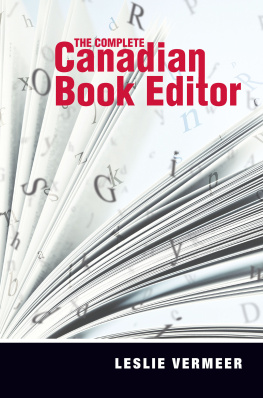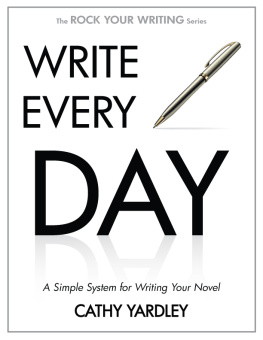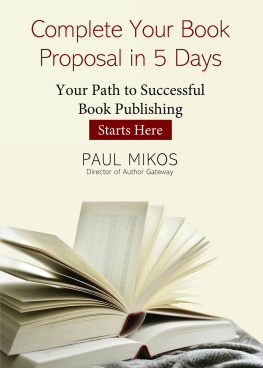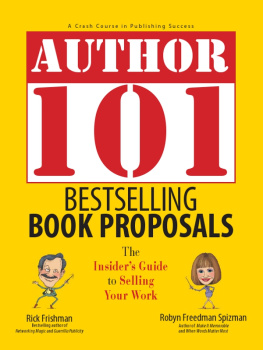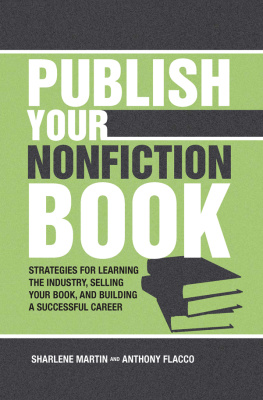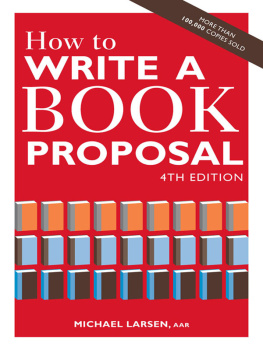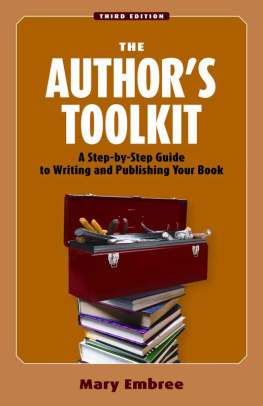Publishing 101
A First-Time Author's Guide to Getting Published, Marketing and Promoting Your Book, and Building a Successful Career
by Jane Friedman
PUBLISHING 101 2014 by Jane Friedman. All rights reserved. No part of this book may be reproduced in any form or by any electronic or mechanical means including information storage and retrieval systems without permission in writing from the author, except by a reviewer, who may quote brief passages in a review. To receive a free monthly e-mail newsletter from the author on how writers can succeed in the digital age, subscribe directly at JaneFriedman.com. First edition.
E-book edition ISBN: 978-0-9863126-0-1
Print edition ISBN: 978-0-9863126-1-8
Edited by Jane Friedman and Mark F. Griffin
Interior and cover design by Jane Friedman
Production coordinated by Jane Friedman
To my writing professors Dr. William Baer and Margaret McMullan, who first introduced me to the world of publishing.
2
Preface: Why This Book Exists
Here is a brief history.
I have been working in the publishing industry, in some form, since the mid-1990s. In 2001, I began working for Writers Digest, the No. 1 brand and community offering education, information, and services to writers in the United States.
In 2008, when I became publisher and editorial director of Writers Digest, I started a blog called There Are No Rules. I posted 4-5 times per week, usually on trends in the publishing industry. After I left Writers Digest in 2010, I continued the blog, then eventually decided to blog only at my own site, JaneFriedman.com, where I continue to post advice for writers related to the business of publishing.
This book is a compilation of my best blog posts since 2008, organized and stitched together as a guide for new authors. Youll notice it has a lot of subheads, bulleted lists, and numbered methodsa stylistic quirk of online writing and particularly blog writing. I also occasionally include articles or longform features I wrote for other venues, as well as Q&As others have conducted with me.
The end result, I hope, is an efficient and effective way to get my basic, 101 advice for writers, without having to navigate hundreds of links or figure out what information is outdated.
Welcome, and lets get started.
3
Introduction: The Dirty Secret About Writing Advice
As the former publisher of Writers Digest, Ive likely read more annals of writing advice than anyone else on the planet. Im intimate with every clich writers hear about how to succeed or fail. And experience has shown me that prescriptive, step-by-step advice sometimes offers a comfortable illusion: that you can reach success systematically or by formula. Such advice, especially when simplified, bulleted, and listed, pushes aside the complexity, difficulty and dilemma of what it means to undertake a writing life.
I have always advised writers in good faith, and would never suggest a writer undertake something harmful, obstructive, or a waste of time. If you were able to internalize all the (sometimes conflicting) advice from hundreds, even thousands, of writersas I haveI do think youd be a better writer for it, if only because youd sooner recognize and maybe avoid the most common pitfalls, as well as recognize the most constructive attitudes. But the writing itself never gets any easier no matter how much you know or publish. The dilemmas never go away.
There are some technical things every writer should learn to do correctly. Formatting and submitting your manuscript is one. Queries might be another. Yet I know talented writers often break all the rules about queries and charm agents anyway. Thats what a very talented writer does. But I cant say that when Im teaching you how to write a great query. I cant teach the exceptions or pleasing eccentricities (or what can boil down to a matter of confidence or nuance). I teach the rules, even though there arent any.
The most honest book I could offer would encompass the following dilemmas and contradictions:
Talent vs. Practice (or Discipline). Some people are born to be writers. Others seem to be blessed with the discipline to get better. Can you succeed without any talent? Which quality is more important? And how do you know if you have any talent to begin with? Certainly those with talent need to practice, tooor not?
Luck vs. Persistence. Ive seen so many lucky writerspeople who were at the right place at the right time. Yet the clich is that luck favors the prepared. That feels true, though Ive met a lot of prepared people who never seem to catch a break.
Confidence/Ego vs. Doubt. Ive never met a writer who didnt have self-doubt, though not all will admit to it. Were waiting to be revealed as complete phonies. Yet without some measure of outrageous egoa belief that you have something to say to the worldtheres no way you could justify writing. Writing is not for the weak. The weak ones give up easily, sometimes with the first rejection.
Professionalism vs. Eccentricity. The writers who are business-savvy and have a flair for marketing & promotion almost always do well. Yet the writers we tend to fall in love with, and the ones we remember, can be the craziest, the most rude, or the most outrageous. Strong personalities sell, too.
Extroversion vs. Introversion. Extroverts network better and find more people to help them. Introverts are naturally suited to writing and often notice all those wonderful details that extroverts miss. Horrible stereotyping here, but still.
This book isnt about those thingsit is (mostly) not philosophical. Rather, this book is about the basics of the writing business, and Ive geared it primarily toward beginning or early career writers who want to get traditionally published.
You may seek the secrets to success and a positive spin on an industry in great upheaval. But just know that the longer Im in the business, the more slippery it all looks. I know what works for some, but it never works for all. I would love to sit down with you personally, and put together a specific plan of attack based on your talents and strengths. I do offer such services, but I hope this book fills the gap in the meantime.
Thank you for reading.
Jane
Chapter 1: The Psychological Battle
I meet many writers who ask (essentially), Read my writing and tell me what I should doif I should keep trying.
I empathize if youre looking for some sign you have talent or that youll eventually make it. Its especially tough to continue doing something when you receive no recognition or encouragement for it.
But what I find is that most reassurances, while offering a boost to a writers ego, are ultimately external, fleeting, and momentary. You need an essential fire inside, or an attitude, that carries you the distance. This attitude is defined by the following:
- Seeking feedback from professionals, and avoiding defensiveness and protectiveness of your work
- Being invested in the writing process and the meaningfulness of what youre doing
- Having patience with the process, and not rushing
- Taking advantage of every possible growth opportunity, and not being resistant to change
- Being proactive rather than waiting to be discovered.
Its a kind of wisdom that comes only from knowing yourself and what you want. As Bob says in Lost in Translation, The more you know who you are, and what you want, the less you let things upset you.


